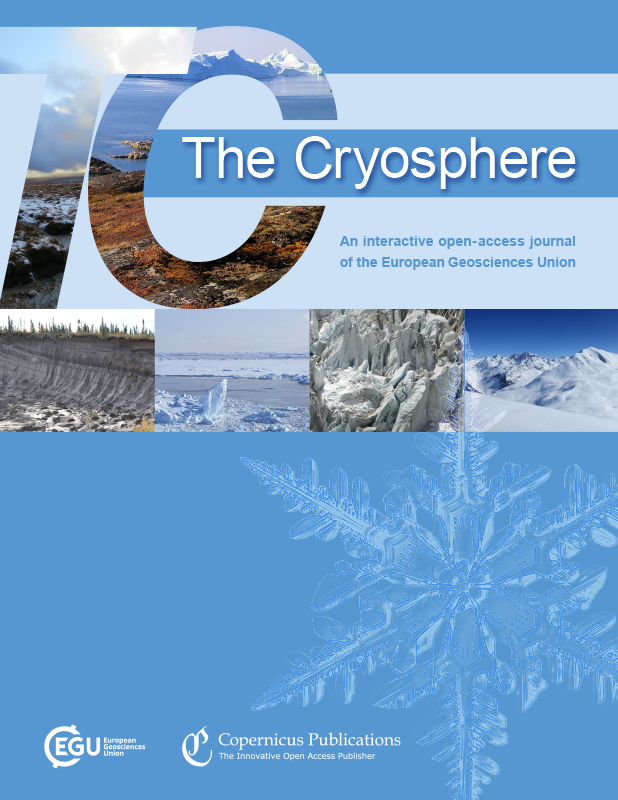Basal melt rates and ocean circulation under the Ryder Glacier ice tongue and their response to climate warming: a high-resolution modelling study
IF 4.4
2区 地球科学
Q1 GEOGRAPHY, PHYSICAL
引用次数: 0
Abstract
Abstract. The oceanic forcing of basal melt under floating ice shelves in Greenland and Antarctica is one of the major sources of uncertainty in climate ice sheet modelling. We use a high-resolution, nonhydrostatic configuration of the Massachusetts Institute of Technology general circulation model (MITgcm) to investigate basal melt rates and melt-driven circulation in the Sherard Osborn Fjord under the floating tongue of Ryder Glacier, northwestern Greenland. The control model configuration, based on the first-ever observational survey by Ryder 2019 Expedition, yielded melt rates consistent with independent satellite estimates. A protocol of model sensitivity experiments quantified the response to oceanic thermal forcing due to warming Atlantic Water and to the buoyancy input from the subglacial discharge of surface fresh water. We found that the average basal melt rates show a nonlinear response to oceanic forcing in the lower range of ocean temperatures, while the response becomes indistinguishable from linear for higher ocean temperatures, which unifies the results from previous modelling studies of other marine-terminating glaciers. The melt rate response to subglacial discharge is sublinear, consistent with other studies. The melt rates and circulation below the ice tongue exhibit a spatial pattern that is determined by the ambient density stratification.莱德冰川冰舌下的基础融化速率和海洋环流及其对气候变暖的响应:高分辨率模型研究
摘要格陵兰岛和南极洲浮动冰架下基底融化的海洋作用力是气候冰盖建模不确定性的主要来源之一。我们使用麻省理工学院总环流模型(MITgcm)的高分辨率、非流体静力配置来研究格陵兰西北部莱德冰川浮舌下Sherard Osborn峡湾的基础融化速率和融化驱动环流。控制模型配置基于莱德2019远征队的首次观测调查,产生了与独立卫星估计一致的融水率。一项模型敏感性实验方案量化了大西洋海水变暖对海洋热强迫的响应,以及地表淡水冰下排放对浮力输入的响应。我们发现,在较低的海洋温度范围内,平均基本融化速率对海洋作用力表现出非线性响应,而在较高的海洋温度下,这种响应与线性响应无法区分,这统一了之前对其他海洋终止冰川的建模研究的结果。冰川下排泄物的融化反应是亚线性的,与其他研究一致。冰舌下方的融化速率和环流表现出由环境密度分层决定的无空间模式。
本文章由计算机程序翻译,如有差异,请以英文原文为准。
求助全文
约1分钟内获得全文
求助全文
来源期刊

Cryosphere
GEOGRAPHY, PHYSICAL-GEOSCIENCES, MULTIDISCIPLINARY
CiteScore
8.70
自引率
17.30%
发文量
240
审稿时长
4-8 weeks
期刊介绍:
The Cryosphere (TC) is a not-for-profit international scientific journal dedicated to the publication and discussion of research articles, short communications, and review papers on all aspects of frozen water and ground on Earth and on other planetary bodies.
The main subject areas are the following:
ice sheets and glaciers;
planetary ice bodies;
permafrost and seasonally frozen ground;
seasonal snow cover;
sea ice;
river and lake ice;
remote sensing, numerical modelling, in situ and laboratory studies of the above and including studies of the interaction of the cryosphere with the rest of the climate system.
 求助内容:
求助内容: 应助结果提醒方式:
应助结果提醒方式:


